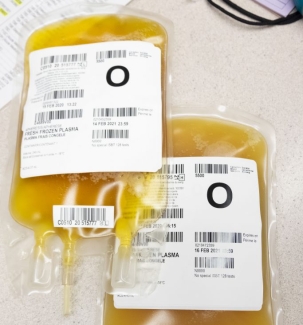Understanding a rare clotting disorder associated with some COVID-19 vaccines
Thursday, December 09, 2021 Tricia Abe
Discoveries made by a research team from McMaster University are providing vital information about a rare but sometimes fatal clotting reaction associated with COVID-19 vaccines that use adenovirus vectors.
The McMaster team included Dr. Donald Arnold, who leads the McMaster Centre for Transfusion Research, a program within Canadian Blood Services’ supported research network. The team described the first cases of a new clotting disorder that has become known as vaccine-induced thrombotic thrombocytopenia, or VITT, in three Canadian patients who developed it after receiving the AstraZeneca vaccine. In a subsequent paper, the research team described the probable mechanism that causes clotting in these patients.
Their findings are significant because, until recently, nothing was known about VITT. Improving our understanding of how clots develop in VITT can lead to better diagnosis and treatment of patients with VITT and possibly prevent VITT from happening in the first place.
To find out more about the research, see our summaries: Treatment and detection of vaccine-induced thrombotic thrombocytopenia, and A proposed mechanism for vaccine-induced thrombotic thrombocytopenia.
Canadian Blood Services – Driving world-class innovation
Through discovery, development and applied research, Canadian Blood Services drives world-class innovation in blood transfusion, cellular therapy and transplantation—bringing clarity and insight to an increasingly complex healthcare future. Our dedicated research team and extended network of partners engage in exploratory and applied research to create new knowledge, inform and enhance best practices, contribute to the development of new services and technologies, and build capacity through training and collaboration. Find out more about our research impact.
The opinions reflected in this post are those of the author and do not necessarily reflect the opinions of Canadian Blood Services nor do they reflect the views of Health Canada or any other funding agency.
Related blog posts
At the start of the pandemic, convalescent plasma was seen as potential therapy for treating COVID-19. But now, an international team led by Canadian scientists has published results from the largest clinical trial on convalescent plasma and COVID-19, showing it is not effective as a treatment against COVID-19.
